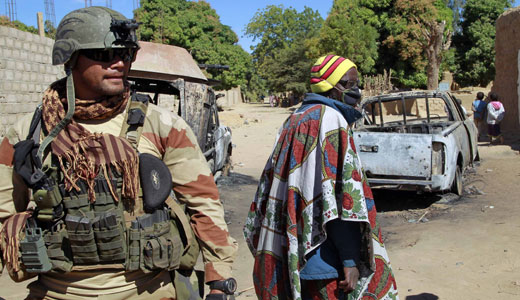
Although cheering throngs have been greeting the advance of Malian and French troops into the North of this beleaguered West African Country, while Islamist fighters have been fading back before them, and although some of the Tuareg separatists are now fighting against their former Islamist allies, the bloodshed may be just starting.
The famous Prussian guru of military strategy, Carl von Clausewitz, asserted that the object of strategy should be to so much damage the enemy forces as to make them incapable of continuing to make war. Mere seizure of points on the map and claiming that battles have been “won” are not relevant measures of success in a war against a determined, ideologically driven enemy.
In the case of the Islamists, who took over more than half of Mali last year, this is far from having been achieved. The Malian, French and other African troops have taken most of the major towns formerly controlled by the Islamist alliance, but Northern Mali is not a country of towns. Nor is it one gigantic sand dune where nobody can hide.
Northern Mali has a topography, which includes many rugged areas, for example the Adrar des Ifoghas mountain range, where guerilla forces can hide out and cache equipment and supplies for long periods. Also, the rebels can maneuver across the whole of the Sahel region, including Algeria and Libya. Furthermore, the Islamists are well supplied, and will continue to be so because they control the smuggling trade across the Sahara desert (drugs, cigarettes, and people). They also have amassed great wealth by kidnapping foreign travelers and holding them for ransom. Despite what the diplomats say, it is also possible that they are getting under the table foreign help, especially from the wealthy Arabian Gulf monarchies (some, including British academic Jeremy Keenan, think that at least previously, they had been getting it from Algerian security services also).
So the Islamist forces, unable to match the French military aviation, have faded back, in relatively good order according to local observers, and are in a position to strike back at Malian and foreign forces and also at regional towns and cities. There already have been casualties from mines and suicide bombers, and on Sunday there was a shootout between Malian troops and fighters of MUJAO (Movement for Unity and Jihad in West Africa), one of the Islamist rebel groups, on the streets of the city of Gao in the North.
Though there are many differences, the parallel with Afghanistan is not completely without merit.
Meanwhile, the usual chaos prevails in the Malian state, including especially the military. First, the Malian troops have been accused, by Human Rights Watch and other observers, of committing abuses against the civilian population in the communities they have recaptured. These include murders of people thought to be Tuaregs, Arabs or Islamists. Civilians have also looted homes and shops of people in these categories, in Timbuktu and elsewhere.
Now the infighting within the Malian military threatens to destabilize things even more. On Friday, troops loyal to Captain Amadou Sanogo marched to attack the barracks of a paratroop unit loyal to former President Amadou Toumani Touré, near Bamako, the capital. Some of the local population including relatives of the paratroopers protested this, and the Sanogo troops fired on them, causing at least one death and several injuries.
Readers may recall that it was this same captain Sanogo who, in March of last year, overthrew the government of President Touré. Sanogo’s move at that time was explained as a reaction of the failure of Mr. Touré’s government to properly supply and support Malian troops fighting Tuareg separatists and Islamist militants in the north, a failure that had led to a brutal massacre of some surrendered troops. Sanogo’s supporters, who included a section of the socialist left in Mali, also suspected that corrupt connections between government officials and the cross-Sahara smuggling trade were behind the Touré government’s ineffectual response to the rebellion. However that may be, the coup did not lead to a more effective effort against the rebels but rather to a military collapse which allowed them to take over the whole Northern part of the country.
The Sanogo troops have continued to play a disruptive role since formally handing power to Mr. Traoré in last year.
So unless something totally unexpected happens very quickly, Mali is in for even more rough times. The French say they want to leave as soon as the Malian army is in shape to take over for them, but the Malian army appears to be a weak reed to lean on. Right now the French are being applauded, but if they get bogged down in an Afghanistan situation, their welcome will wear thin.
In the meanwhile, little or nothing is being done about the reason that Mali and its neighbors are in such trouble: Grinding poverty and weak states. To solve those interlinked problems will require not just some charitable help from outside, but revolutionary changes that radically transform the relationship of the Sahel area to the world’s economic and political power centers.
And revolutionary changes can’t be imported.
Photo: A French soldier secures a perimeter in Mali on Jan. 21. Jerome Delay/AP












Comments